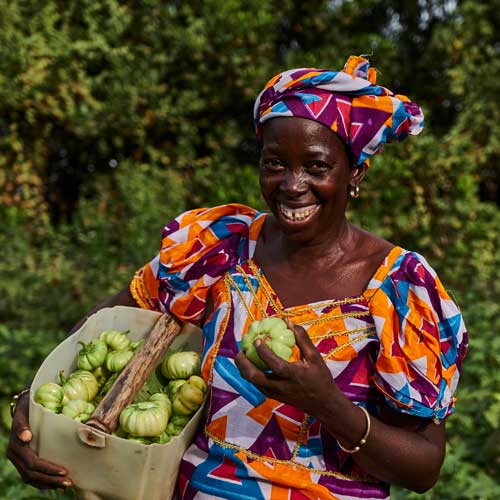Funding trees and supporting communities
At Zurich, we help you to protect the things that matter most. From your family and livelihood to your hopes and dreams, we’re dedicated in helping to sustain your world. That’s why we have partnered with Trees for the Future.

Who are Trees for the Future?
Since 1989, Trees for the Future (TREES) have enabled the planting more than 404,000,000 trees and restored 142,000 acres of land.
With more than 30 years of agroforestry experience, TREES provides the tools and training so that farmers can reclaim their agency and break the cycles of hunger, poverty and environmental damage.
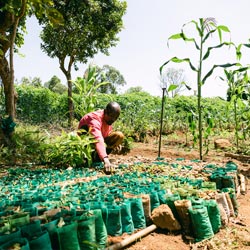
What is Zurich doing to help?
With our partnership, we are proud to be helping to fund Trees for the Future’s planting and restoration projects in Africa.
Over two years from January 2024, Zurich’s funding will enable the planting of more than a million trees across Mali and Senegal in West Africa therefore helping to restore land which has suffered from degradation or resource depletion.
As of April 2025, we have helped plant 489,740 trees.
The projects which we support help to train farmers to adopt more sustainable and regenerative practices, empower women, restore degraded land, and support the local families who depend on it.
The projects which Zurich are supporting through its funding:
Expansion Project in Mali
Due to its proximity to cities, the natural resources of this area are under increasing pressure. This has resulted in a loss of tree cover over time and, combined with the continued use of unsustainable farming practices, is leaving communities without the vital resources needed to survive. This project will address those issues, with an emphasis on regenerating the landscape via agroforestry techniques and the Forest Garden method.
Over two years, our funding will help to:
- Plant approximately 600,000 trees
- Empower 240 farming families to escape poverty and food insecurity
Great Green Wall in Senegal
The Great Green Wall was imagined in the 1970s in an effort to stop land degradation at a time of record droughts and concerns of deforestation from the encroaching of the Sahara.
The Great Green Wall now brings life back to the degraded landscapes to provide food security, poverty reduction, and a hope for the communities who live along its path. This project will address these issues by implementing the Forest Garden method and training farmers in regenerative agroforestry techniques.
Over two years, our funding will help to:
- Plant approximately 600,000 trees
- Empower 240 farming families to escape poverty and food insecurity
Meet the people making these projects happen
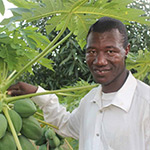
Expansion Project in Mali
Meet Seydou
Seydou Togola is a farmer from Koulikoro, Mali, who joined TREES in 2021 alongside 248 other farmers. Together they have had great success in transforming their land via the Forest Garden approach.
Seydou is the lead farmer of his group: Groupe de Ternabougou, named after their village. His group consists of 8 farmers, who are responsible for supporting 130 people across their households. Collectively they have completed 94 workshops, planted roughly 35,000 trees in their Forest Gardens and are set to graduate this year.
By year 3, Seydou had been responsible for planting 4,600 trees, and his farm boasted 20 different plant species, 8 of which are direct food crops and 4 grown to sell on the market. By year 4, the number of trees had grown to 7,756 and Seydou joined his local Village Savings and Loans Association (VSLA).
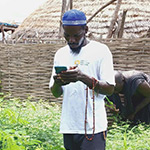
Great Green Wall in Senegal
Meet Filly
Filly Bamba is a 38-year-old farmer participating in the Tambacounda project based in Niéménéké village. Filly is among this year’s new farmers in Senegal, recently enrolled in the Forest Garden program. As a member of the Tamba 1 project, he has been learning and training how to best set up a Forest Garden.
His Forest Garden has allowed him to comfortably provide for his family of six.
"I used to farm hectares and hectares of land using traditional farming methods. But the harvests were not good and really did not provide the money for the time invested. I dreamt of a more sustainable approach but did not know where and how to get started, especially on the technical side of things,”
Now, with the help of his five children, he maintains a farm that grows a wide variety of crops including chili peppers, lemons, tomatoes, mangoes, corn, millet, sorghum, beans and peanuts.
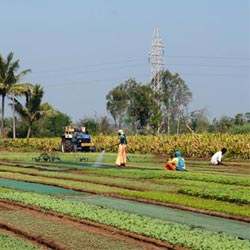
Our commitment to sustainability
Zurich is committed to protecting our environment, both as a responsible insurer and an environmentally-conscious company.
We are constantly working to reduce our carbon footprint and continuously seek opportunities to reduce energy and water use, waste, commuter/business travel and paper consumption. We also consider the environment when designing products and services.
